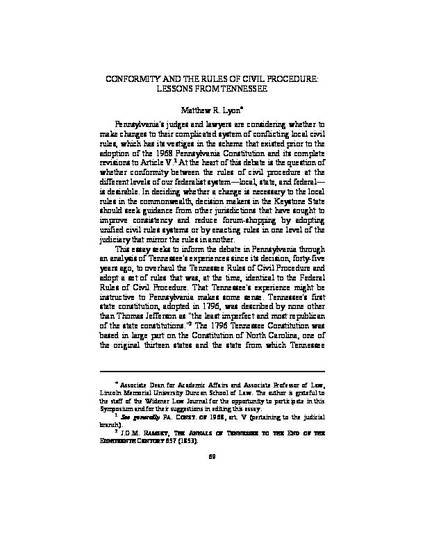
Article
Conformity and the Rules of Civil Procedure: Lessons From Tennessee
Widener Law Journal
(2017)
Abstract
Pennsylvania's judges and lawyers are considering whether to
make changes to their complicated system of conflicting local civil
rules, which has its vestiges in the scheme that existed prior to the
adoption of the 1968 Pennsylvania Constitution and its complete
revisions to Article V.1 At the heart of this debate is the question of
whether conformity between the rules of civil procedure at the
different levels of our federalist system—local, state, and federal—
is desirable. In deciding whether a change is necessary to the local
rules in the commonwealth, decision makers in the Keystone State
should seek guidance from other jurisdictions that have sought to
improve consistency and reduce forum-shopping by adopting
unified civil rules systems or by enacting rules in one level of the
judiciary that mirror the rules in another.
This essay seeks to inform the debate in Pennsylvania through
an analysis of Tennessee's experiences since its decision, forty-five
years ago, to overhaul the Tennessee Rules of Civil Procedure and
adopt a set of rules that was, at the time, identical to the Federal
Rules of Civil Procedure. That Tennessee's experience might be
instructive to Pennsylvania makes some sense. Tennessee's first
state constitution, adopted in 1796, was described by none other
than Thomas Jefferson as "the least imperfect and most republican
of the state constitutions."2 The 1796 Tennessee Constitution was
based in large part on the Constitution of North Carolina, one of
the original thirteen states and the state from which Tennessee
emerged.3 North Carolina's first state constitution, in turn, derived
a number of its provisions on individual rights, taxes, and
legislative authority from the Pennsylvania Constitution of 1776.4
Part I of this essay provides background information on
Tennessee's civil court system, including the adoption of the
Tennessee Rules of Civil Procedure in 1971. Part II highlights
several significant amendments to the Federal Rules of Civil
Procedure since the early 1970s, some of which have been made
through the formal rulemaking process and others of which have
occurred, more suddenly, through United States Supreme Court
decisions shifting well-established interpretations of the Federal
Rules. Part III documents how the Federal and Tennessee Rules
have grown increasingly dissimilar since 1971, through both
inaction at the state level and affirmative decisions by the
Tennessee General Assembly or Tennessee Supreme Court not to
adopt rules changes that were made in the federal system. Part IV
concludes the essay by considering lessons learned from
Tennessee's effort to conform to the Federal Rules.
Keywords
- Civil Procedure,
- Tennessee
Disciplines
Publication Date
2017
DOI
http://heinonline.org/HOL/Page?handle=hein.journals/wjpl26&g_sent=1&casa_token=&collection=journals&id=75
Citation Information
Matthew R. Lyon, Conformity and the Rules of Civil Procedure: Lessons From Tennessee, 26 Widener L.J. 69 (2017).
